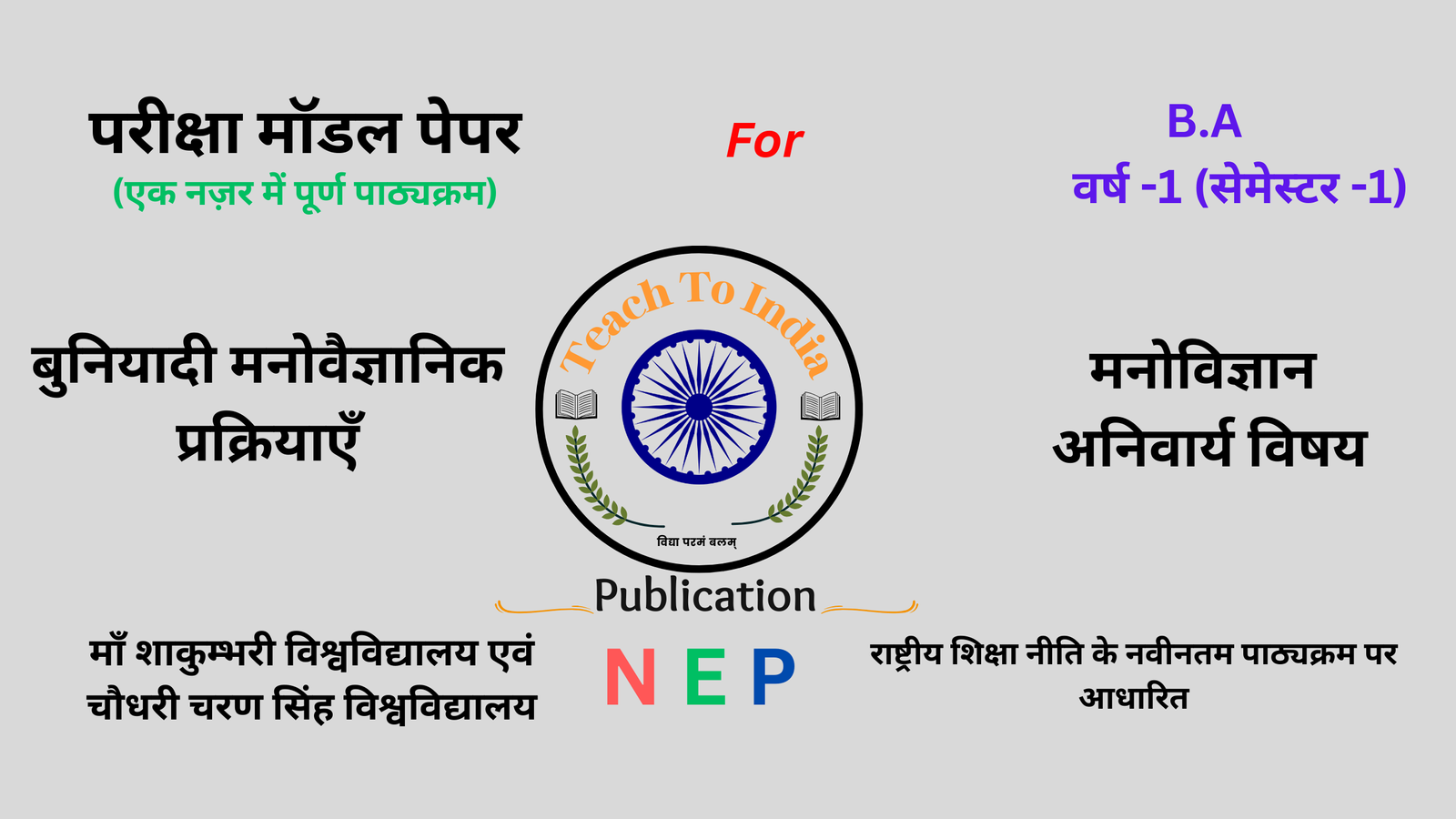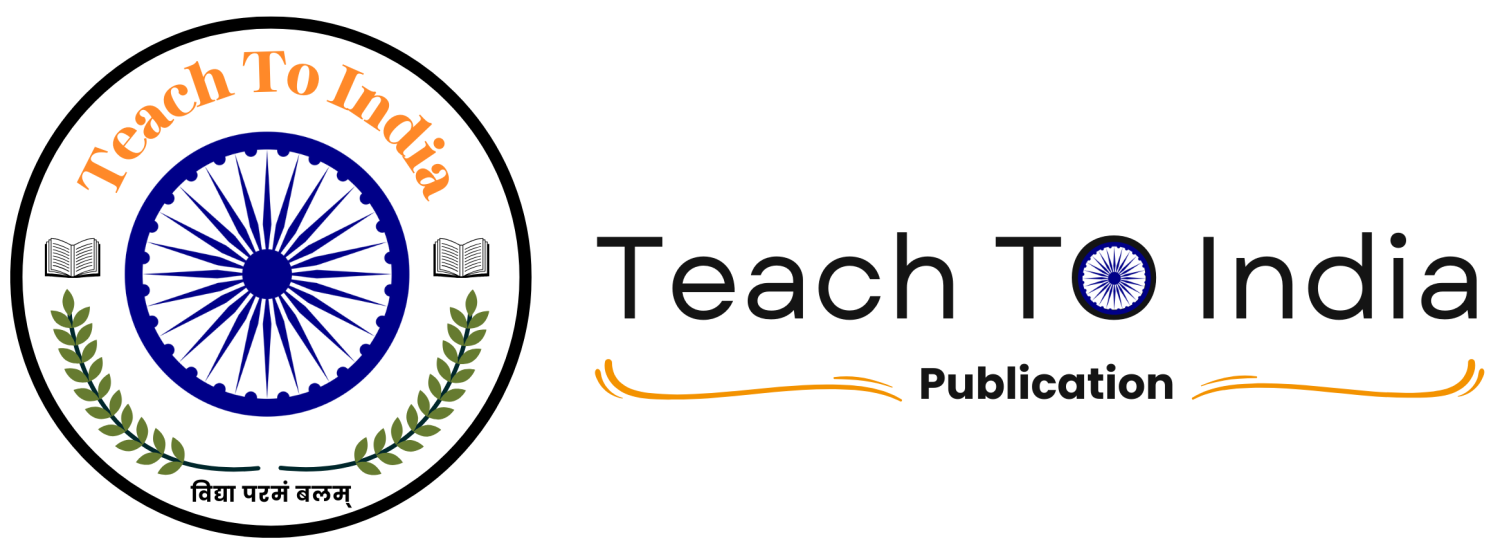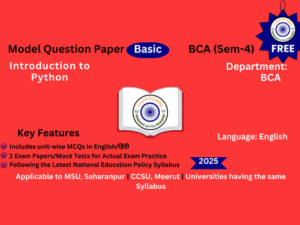बुनियादी मनोवैज्ञानिक प्रक्रियाएँ (सेमेस्टर -1)
- Description
- Curriculum
- Reviews

Teach To India प्रकाशन
बुनियादी मनोवैज्ञानिक प्रक्रियाएँ
-
यह मॉडल पेपर यह सुनिश्चित करता है कि सभी संभावित प्रश्न जो परीक्षा में आ सकतेहैं, वे यूनिट में पूरी तरह से शामिल हैं, चाहे वे सीधे हों या अप्रत्यक्ष रूप से।
-
इसे अनुभवी प्रोफेसरों द्वारा बहुत सावधानी से तैयार किया गया है, जिन्हें परीक्षा मॉडल पेपर बनाने का व्यापक अनुभव है।
-
इस पेपर में विश्वविद्यालय द्वारा निर्धारित पाठ्यक्रम के आधार पर सभी मुख्य प्रश्न शामिल हैं।
-
400 से अधिक प्रश्न और उत्तरों के साथ, यह मॉडल पेपर विषय का पूरा पाठ्यक्रम कवर करता है।
-
प्रत्येक यूनिट में दीर्घ उत्तरीय ,लघु उत्तरीय और अति लघु उत्तरीय वाले प्रश्न शामिल हैं ताकि छात्रों को गहन समझ प्राप्त हो सके।
-
हमारे प्रश्न इस तरह तैयार किए गए हैं कि प्रत्येक यूनिट को कम से कम और अच्छी तरह चुने हुए प्रश्नों से कवर किया जा सके।
-
अनिवार्य आंतरिक परीक्षा के लिए हम 200 एक पंक्ति के प्रश्न-उत्तर प्रदान कर रहे हैं, जो प्रत्येक यूनिट को समान रूप से कवर करते हैं।
-
इस मॉडल पेपर में मॉक प्रश्नपत्र / पिछले साल के प्रश्नपत्र भी हल के साथ दिए गए हैं, जिससे छात्रों को परीक्षा के प्रश्नों की गहराई और विस्तार को समझने में मदद मिलती है।
|
Programme /Class: Certificate |
Year: First |
Semester: First |
||
|
Subject: Psychology |
||||
|
Course Title: Basic Psychological Processes |
||||
|
Course outcomes: The students will learn about the fundamental processes and core psychological concepts, models, classical theories, varied perspectives, and will be able to apply them in their own and in others’ lives. It will also give the learner a clear understanding of the concepts like intelligence, motivation, emotion and personality. It will develop critical analytical skills regarding these individualistic traits.
|
||||
|
Credits: 4 |
Core Compulsory |
|||
|
Max. Marks: 25+75 |
Min. Passing Marks: 8+25 |
|||
|
Unit |
Topics |
|||
|
I |
Psychology: Nature, Scope and Applications; Approaches: Psychodynamic, Behaviouristic, Cognitive, Humanistic & Indigenous Indian Psychology.
|
|||
|
II |
Biological bases of Behaviour: Divisions of Nervous System; Neural conduction and synaptic transmission; structure and functioning of the brain; endocrine glands and their effects.
|
|||
|
III |
Attention Processes: Selective and Sustained Attention: Nature and Determinants; Perceptual Processes: Nature and Determinants; Perceptual Organization; Perceptual Illusion.
|
|||
|
IV |
Learning: Classical Conditioning, Operant Conditioning, learning by insight and observation learning.
|
|||
|
V |
Memory and Forgetting: Stages of Memory: Encoding, Storage and Retrieval; Types of Memory: Sensory, Short Term and Long Term Memory (Basic Introduction); Forgetting: Decay, Interference and Cue-Dependent Forgetting.
|
|||
|
VI |
Intelligence: Nature and Definition; Concept of IQ; Theories of Intelligence (Introduction of Basic Concepts)
|
|||
|
VII |
Personality: Definition and Determinants; Approach of Personality (Basic Concepts): Trait, Psychodynamic, and Humanistic approaches.
|
|||
|
VIII |
Motivation: Nature and Concept (Needs, Drives, Instincts); Types of Motives: Biological and Social Motives; Emotion: Nature of Emotion; Basic Emotions; Expressions of Emotion: Universal Versus Culture Specific; Theories of Emotion: James-Lange, Cannon-Bard, Schechter-Singer.
|
|||
-
1यूनिट-1: बुनियादी मनोवैज्ञानिक प्रक्रियाएँ
-
2यूनिट-2: बुनियादी मनोवैज्ञानिक प्रक्रियाएँ
-
3यूनिट-3: बुनियादी मनोवैज्ञानिक प्रक्रियाएँ
-
4यूनिट-4: बुनियादी मनोवैज्ञानिक प्रक्रियाएँ
-
5यूनिट-5: बुनियादी मनोवैज्ञानिक प्रक्रियाएँ
-
6यूनिट-6: बुनियादी मनोवैज्ञानिक प्रक्रियाएँ
-
7यूनिट-7: बुनियादी मनोवैज्ञानिक प्रक्रियाएँ
-
8यूनिट-8: बुनियादी मनोवैज्ञानिक प्रक्रियाएँ







